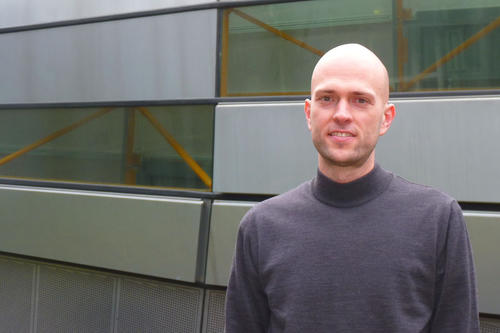Connectivity in Everyday Life
French computer scientist Emmanuel Baccelli is a German Academic Exchange Service (DAAD) visiting scholar at Freie Universität. He is developing new transmission techniques for the Internet of Things.
Mar 03, 2014
He deals with things like smart TVs and heating controls: French computer scientist Emmanuel Baccelli, a German Academic Exchange Service (DAAD) visiting scholar at Freie Universität Berlin, researches the Internet of Things.
Image Credit: Bianca Schröder
The heater can be turned up even before you get home, your TV becomes a communication center, and supply chains automatically coordinate with each other. In the “Internet of Things” (IoT), objects communicate intelligently with people, plus they increasingly control themselves. But the flow of information is still slow and prone to errors.
“The Internet was simply not developed for devices with such low processing and storage capacity,” Emmanuel Baccelli says. Baccelli, who holds a doctorate and is an expert on mobile Internet communications at the prestigious INRIA computer science institute in Paris, is teaching and doing research at Freie Universität Berlin for a year as part of a German Academic Exchange Service (DAAD) visiting lecturer position
One area of focus in the 36-year-old Frenchman’s work is the development of new transmission techniques that meet the requirements of smart everyday objects. He is one of the initiators of the RIOT open source operating system. The software helps programmers to implement developments for the Internet of Things significantly more easily and identify existing weak points.
This is a necessary step, since the number of connected electrical appliances is rising, and many manufacturers have been rather neglectful in their treatment of the topic of security so far. Third-party support is not possible, since the software is usually not free. That has consequences for end users, as an incident with Korean electronics giant LG a few weeks ago showed. The manufacturer’s smart TVs were collecting user data and transmitting them without encryption.
Leveraging Crowd Capabilities
In light of these kinds of challenges, Baccelli says it is especially important for RIOT to be freely accessible. “An open source operating system makes it possible for a large number of contributors to deal with system security, eliminate errors, and develop innovations. The industry is not showing enough of an interest in this.” But, he says, the concern about security gaps should not obstruct the view of the opportunities offered by the Internet of Things; it could help conserve energy, for example, or support medical applications.
Fostering International Dialogue
Baccelli works with colleagues from various countries on RIOT. International dialogue among researchers is important to him; he is also pushing for closer cooperation between Freie Universität and INRIA.
Baccelli himself already spent a year doing research as a postdoc in Berlin, in 2006, and before that he also spent some time in the U.S.: For his master’s thesis, he did an internship at the research labs of telecom firm AT&T in New Jersey for six months in 2000, and after that he worked for a startup in Silicon Valley for two years. “It was right at the time of the dot-com bubble, an exciting period,” Baccelli says. But, he adds, it also didn’t take long for him to realize he wanted to work in the research sector in the long term. He completed his professorial qualifications (habilitation) at Université Pierre et Marie Curie in 2012.
Understanding the Fundamentals of Connected Systems
Alongside RIOT, Baccelli’s work also focuses on “information-centric networks.” The goal is to distribute content more efficiently on the Internet.
Baccelli is passing along his knowledge to computer science students at Freie Universität. This semester, he is teaching a class on computer networks. “It’s important to me for students to understand the fundamentals of connected systems, even if they will only deal with certain aspects later on in their professional lives,” he explains. His plans for the summer semester include a hands-on introduction to the RIOT operating system.
Further Information
-
Emmanuel Baccelli, Department of Mathematics and Computer Science, Institute of Computer Science, Tel.: +49 30 838 72184, Email: Emmanuel "dot" Baccelli "at" inria "dot" fr

